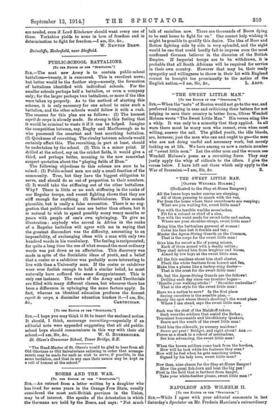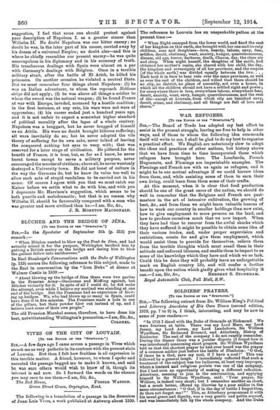NAPOLEON AND WILHELM II.
[To THE EDITOR Or THE "SPECTATOR."]
Sin,—While I agree with your editorial comments in last Saturday's Spectator on Mr. Frederic Harrison's extraordinary suggestion, I feel that some one should protest against your description of Napoleon I. as a greater sinner than Wilhelm II. No doubt Napoleon was our bitter enemy ; no doubt he was, in the later part of his career, carried away by his dream of a universal Empire; no doubt also—and this is where be chiefly resembles our present enemy—he was quite unscrupulous in his diplomacy and in his economy of truth. His treacherous dealings with Spain were almost on a par with Germany's dealings with Belgium. Once in a terrible military strait, after the battle of El Arish, he killed his prisoners. On another occasion he violated a neutral State. But we must remember four things about Napoleon: (1) he was an Italian adventurer, to whom the reproach Noblesse oblige did not apply ; (2) he was above all things a soldier to whom the sword was the natural weapon; (3) he found France at war with Europe, invaded, menaced by a hostile coalition ; in the first instance, at any rate, his wars were not wars of aggression; (4) his career ended just a hundred years ago, and it is not unfair to expect a somewhat higher standard of political morality after the lapse of a whole century. Napoleon was a braggart, but he never bragged of himself as an Attila. His wars no doubt brought hideous suffering; all wars inevitably do so; but he never adopted the vile theory of suffering for its own sake, never talked of leaving the conquered nothing but eyes to weep with; that was reserved for a later stage of civilization. He pilfered for the benefit of France, it is true, but, so far as I know, he never burnt towns except to serve a military purpose, never encouraged the murder of civilians; above all, he never wantonly destroyed a University town. He did not boast of culture in the way the Germans do, but he knew its value too well to allow such acts of stupid vandalism to be carried out in his name. Of course I agree with you that we must catch our Kaiser before we settle what to do with him, and with you I deprecate Mr. Harrison's suggestion, which seems to be both puerile and melodramatic ; but that is no reason why Wilhelm IL should be favourably compared with a man who was greater and more civilized than he.—I am, Sir, &e., J. R. MOBETON MACDONALD.



































 Previous page
Previous page